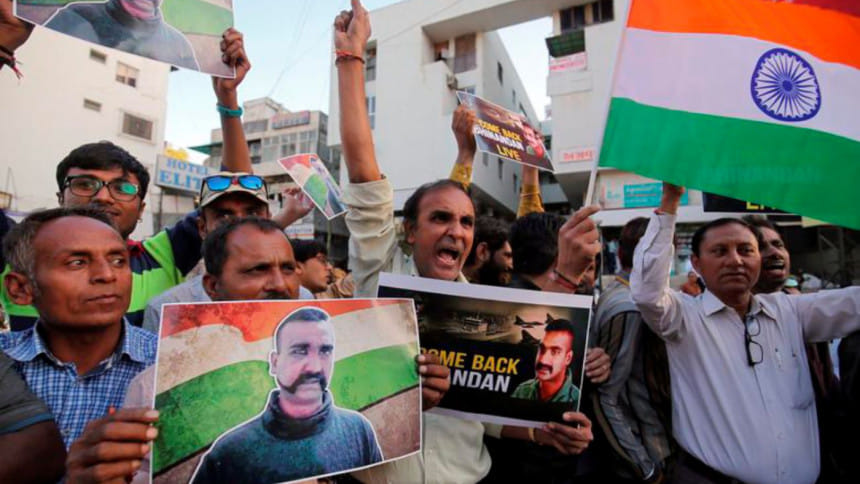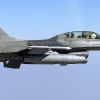Only possible through the dismantling of the terror apparatus

The homecom-ing of Indian Air Force Wing Commander Abhinandan Varthaman from two days of captivity in Pakistan on Friday is considered by some as the first sign of de-escalation of the hostilities and the visible resultant tensions between India and Pakistan in the last few days. On February 26, Indian warplanes struck terror group Jaish-e-Mohammed's biggest training camp in Pakistan's Khyber Pakhtunkhwa province and the Pakistan Air Force planes hit back the very next day attempting unsuccessfully to target Indian military installations in Jammu and Kashmir.
For the first time since the India-Pakistan war of 1971, fighter jets of the two countries engaged in an air combat during which Abhinandan, flying a Russia-made MiG-21, shot down a US F-16 aircraft of Pakistan before his own plane took a hit forcing him to eject and land up in Pakistan-occupied Kashmir.
The February 26 "non-military pre-emptive strike" by the IAF needs to be seen in the perspective of the fight against terror 12 days after a Jaish suicide bomber blew up a bus carrying Indian paramilitary men, killing 40 people in Pulwama. By contrast, Pakistan tried to assault Indian military assets, an action which India described as an "act of aggression". War clouds loomed large after the PAF plane's intrusion into Indian airspace. Three senior officers of the Indian military, at a rare joint media appearance, announced on the night of February 27 that India has set the stage for a full-spectrum response involving the army, the air force and the navy to deal with "further provocations" from Pakistan. The military also said the operations against terror camps would continue.
Pakistan came under intense diplomatic pressure from the five veto-wielding countries of the UN Security Council—the US, the UK, France, Russia and China—and two of Pakistan's closest allies, Saudi Arabia and the UAE, not to precipitate the situation. Adding to the heat on Pakistan was India's steadfast refusal to allow the former's bid to use the captured IAF wing commander as a bargaining tool. All this prompted Pakistan's Prime Minister Imran Khan to announce the release of Abhinandan. Khan tried to take the high moral ground by terming the decision to free the Indian pilot as a "gesture of peace." India rebuffed it by linking the move to Pakistan's obligation under the Geneva Conventions. To say the least, India was unimpressed by the "gesture of peace" and produced evidence in public that a part of the wreckage of the F-16 which Abhinandan shot down during the dog-fight made it clear that Pakistan had used an Advanced Medium-Range Air-to-Air Missile (AMRAAM) against India on that day. This is the missile the US supplied to Pakistan for use against the Taliban.
New Delhi was determined not to allow Islamabad to use Abhinandan as a gambit. India had learnt its lessons from what had happened after the December 1999 hijacking of an Indian Airlines plane, which was forced to land in Kandahar, Afghanistan, when the then Atal Bihari Vajpayee government had freed four top Pakistani terrorists, including Jaish founder Masood Azhar, in return for the safety of more than 150 passengers of the Indian Airlines plane.
In a diplomatic démarche to the acting Pakistani High Commissioner in New Delhi, the Indian government made it clear to Pakistan that there would be no negotiation to secure the release of Abhinandan and insisted on his unconditional, safe return. In the hours ahead of Khan's announcement of Abhinandan's release, India had put its combat military units at the highest preparation stage. The media conference of the three senior officers of the Indian army, air force and navy only served to amplify India's tough line already conveyed through diplomatic channels.
Pakistan found itself pushed into a corner as countries that wield considerable power around the world leaned on its leadership for restraint. What decisively swung the matter in India's favour is American Secretary of State Mike Pompeo's statement that characterised India's airstrike in Balakot—the first in nearly five decades—as part of New Delhi's counter-terror actions. All this contributed to diplomatic blowback due to terrorism in Pakistan. The flurry of diplomatic efforts by the US, France, the UK and Saudi Arabia also saw their leaders calling up the Indian and Pakistani leaderships and the Saudi ambassador meeting with them in Islamabad and New Delhi.
It is for India to decide whether it can climb down the escalation ladder and, at the same time, reserve the right to take punitive military action in case of an offensive by Pakistan's military. For Prime Minister Narendra Modi's government, it may be difficult to soften its hard line, especially in view of coming parliamentary elections. India has made its point by launching the airstrikes on the Jaish terror camp deep inside Pakistan and established that Pakistan's Air Force was left a mute spectator. The contrast could not be starker: while the Indian action was aimed at a terror camp, Pakistan was targeting the Indian army.
The war clouds over India and Pakistan may have thinned a little but they are far from dispersing. De-escalation of tensions can be meaningful only if its key element—dismantling of the terror apparatus in Pakistan—is addressed. Otherwise, it will not take long to be back to square one again. It is not going to be easy, either for India or the international community, to make Pakistan stop giving a safe haven to terror groups which have for long troubled its neighbours India, Iran and Afghanistan, or to convince the Pakistani military that such a strategy may have reached the point of diminishing returns. It is time for Pakistan to ask: what and how have its national interests been served by giving shelter to terror groups and their leaders like Masood Azhar?
Pallab Bhattacharya is a special correspondent for The Daily Star.







Comments